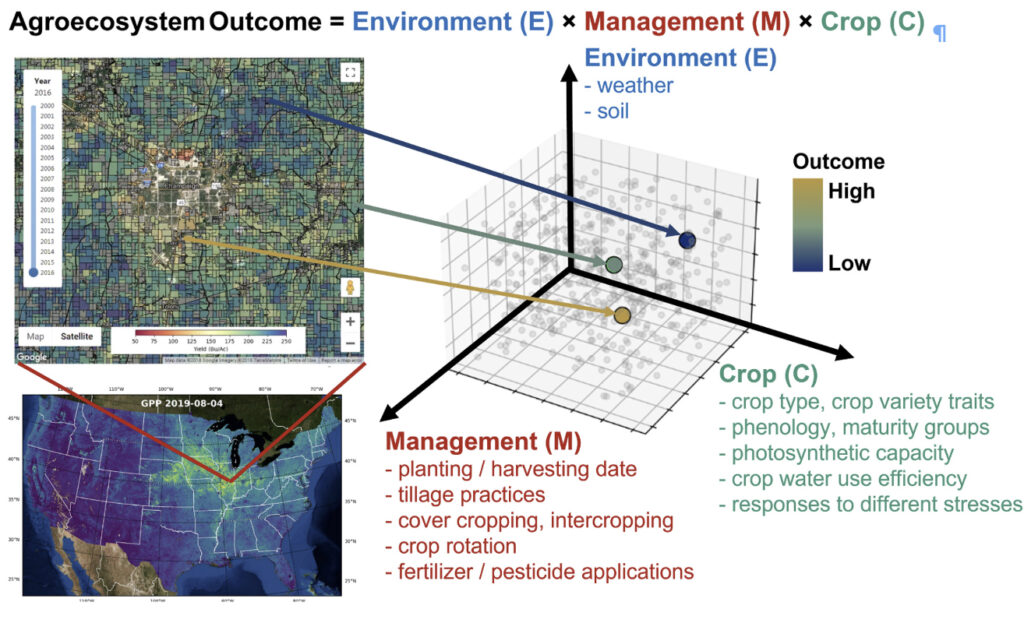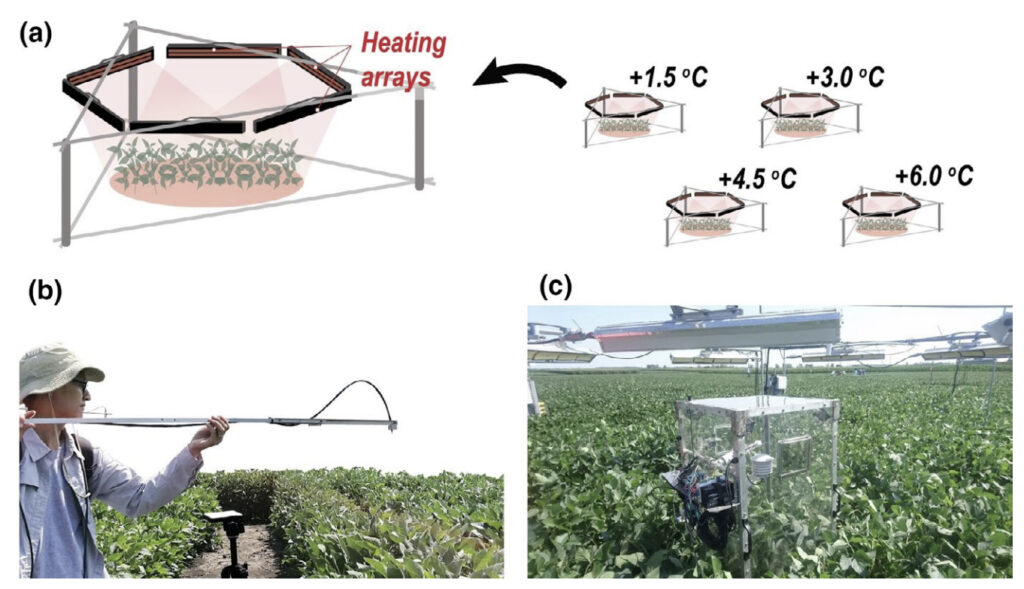Research Themes
We study the complex dynamics of crop productivity, its response to management practices and environmental stresses, and its resilience to climate change. Our aim is to understand the multifaceted interplays between crops, management, and environmental conditions, to inform adaptive and sustainable agricultural practices in a changing climate.
Core Faculty and Researchers
Lisa Ainsworth, Kaiyu Guan, Andrew Margenot, DoKyoung Lee, Bin Peng, Sheng Wang
Representative Projects
NASA Carbon Monitoring System for the US Midwest cropland (funded by NASA)
 Team members:
Kaiyu Guan, Bin Peng, Evan DeLucia, and collaborators from NOAA and University of Colorado, JPL, Carnegie.
Team members:
Kaiyu Guan, Bin Peng, Evan DeLucia, and collaborators from NOAA and University of Colorado, JPL, Carnegie.
With rising demands of food and fiber from a growing global population, the agricultural landscape plays an increasingly important role in the global carbon cycle. Cropland also represents one of the biggest opportunities for carbon sequestration. However, there is a lack of comprehensive carbon monitoring systems over cropland. This NASA Carbon Monitoring Systems (CMS) project integrates both bottom-up (inventory and process-based modeling) and top-down (atmospheric inversion) approaches to jointly quantify the carbon budget for the US Corn Belt. Multiple streams of satellite remote sensing data are used to improve carbon budget estimations. This effort carries a great promise to further constrain the regional and global carbon cycle and the carbon budget products generated from this project can be used by the public and private sectors to design effective policies and management practices that can contribute to stabilizing atmospheric CO2 concentrations. See more information at https://carbon.nasa.gov/cgi-bin/inv_pgp.pl?pgid=3748&fullab=1.
Understanding higher Temperature, VPD, and ozone stresses on crops (funded by USDA NIFA)
 Team members: Lisa Ainsworth, Carl Bernacchi, Kaiyu Guan, Bin Peng
Team members: Lisa Ainsworth, Carl Bernacchi, Kaiyu Guan, Bin Peng
Global environmental changes are stressing our crop production system. Deepening our understanding of mechanisms and potential adaptation pathways for the environmental stresses on crop production is critical for global food security. ASC scientists have been striving to quantify and partition different mechanisms of high temperature, VPD and ozone stress impacts on corn and soybean yield from plant to ecosystem scales, combining the field experiments and process-based modeling. The long-term goal of these projects is to incorporate experiment-based evidence of important physiological and biological mechanisms into process-based crop models to assess environmental change impacts and assess possible adaptive traits for crop breeding for crops grown in the U.S. Corn Belt.
Advancing sustainable agriculture: An Airborne-Satellite-AI-HPC integrative framework (ASAI) to monitor crop conditions, soil health, and management practices in the U.S. Corn Belt (funded by Discovery Partners Institute)
 Team members:
Wang, Guan, Ainsworth, Schwing, Katz, and collaborators from University of Chicago, Argonne National Lab.
Team members:
Wang, Guan, Ainsworth, Schwing, Katz, and collaborators from University of Chicago, Argonne National Lab.
The agriculture industry of Illinois employs around 1.5 million workers, covers 27 million acres (75% of the state), produces more than $19 billion GDP annually, and is an essential pillar for the Illinois economy. However, emerging challenges, such as increased extreme weather, environmental degradation, and increased biotic stress, all threaten the sustainable development of agriculture. This project aims to develop an innovative high-resolution monitoring system to enable agricultural stakeholders to maximize crop yield and minimize negative environmental impact of agriculture. The technology integrates field measurements, airborne hyperspectral imaging, and multi-source satellite fusion data through radiative transfer process-guided machine learning to quantify crop characteristics, farming management practices, and environmental conditions for every field across Illinois and beyond. This monitoring system significantly strengthens stakeholders to detect emerging agricultural threats, mitigate climate change impact, and increase short-term and long-term economic return. See more details at https://dpi.uillinois.edu/advancing-sustainable-agriculture/
